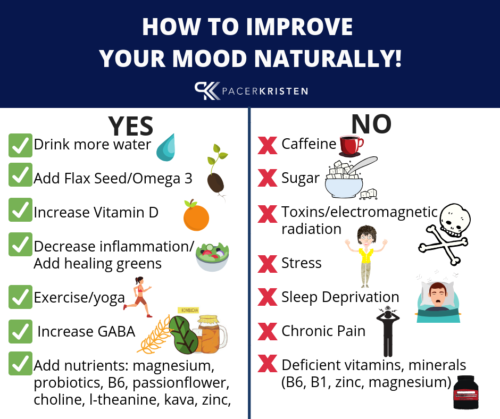Submitted by Tanya Randall, MD
Usually, the holidays bring us increased stress, anxiety, and depression. But 2020 has been a whole year of stress, anxiety, and depression. Now with Covid-19 increasing again, we will have a very different holiday season. Whatever your holiday plans fueling your body correctly is important in conquering anxiety, stress, and depression. Eating whole foods that contain antioxidants, vitamins, and minerals will help your body produce neurotransmitters that will improve your mood.
Neurotransmitters are chemicals in your brain that help the cells communicate with each other. There are a few chemicals, serotonin, dopamine, and norepinephrine, responsible for regulating your mood. Serotonin is the key neurotransmitter that stabilizes our mood, feelings of well-being, and happiness. Low serotonin levels are often associated with many behavioral and emotional disorders such as depression, anxiety, suicidal behavior, and obsessive compulsive disorder. Cravings for sweets and carbohydrate-rich foods and feelings of fatigue, irritability, and insomnia also occur with low serotonin levels. While serotonin is the happiness hormone, dopamine is the feel-good hormone. This article will discuss the role that food, vitamins, and minerals have in increasing your level of serotonin and improving your mood.
There are many ways to increase your serotonin naturally. Serotonin is made in the brain by a chemical reaction. Like any reaction, you can increase the results by increasing the reactants, the cofactors, or the enzymes, making the reaction occur faster and make more product. In this section, we will discuss the foods that will increase your serotonin levels. We will then discuss the antioxidants that improve your mood and other foods that may affect your mood. You cannot get serotonin from food, but you can get tryptophan, an amino acid converted to serotonin in your brain. Foods high in amino acids are one source of tryptophan, which will increase your serotonin levels. Tryptophan does not easily cross into the brain. It requires help from carbohydrates to enter the brain. Almost all foods high in protein are high in tryptophan. Examples include turkey, salmon, Greek yogurt, eggs, sunflower seeds, chia seeds, and hemp seeds.
Another way to increase serotonin production is to increase the cofactor or coenzyme, which are required for the enzyme activity. Nutrients that are cofactors are folate, B complex vitamins, iron, and magnesium. Folate is abundant in avocado, dark leafy vegetables, almonds, oatmeal, and oranges. Cashews and mussels are high in B complex vitamins. Dark leafy vegetables and oatmeal are also high in iron. Foods that are a good magnesium source are dark leafy vegetables, cashews, almonds, eggs, oatmeal, and dark chocolate. Vitamin D is a coenzyme that increases the production of serotonin. Along with omega-3 fatty acids, vitamin D also increases the storage, release, and receptor activity of serotonin. Food sources of vitamin D and omega-3 fatty acids are fatty fish (salmon, albacore tuna, sardines, trout, anchovies, and mackerel), fish oil, and eggs. Additional foods high in omega-3 fatty acid are walnuts, avocados, chia seeds, and hemp seeds.

Once you have lots of serotonin circulating in your brain, you need receptors for the serotonin to attach to and react. Zinc is an important mineral in the regulation of the serotonin receptors in the brain. A diet deficient in zinc may cause depression and anxiety. But supplementation or increased intake may improve mood and cognitive function. Your body does not store zinc; therefore, it is necessary to take some every day. Foods high in zinc are cashews, pumpkin seeds, eggs, mussels, and oatmeal. Antioxidants are natural substances that may prevent or delay some types of cell damage. Cell damage can lead to depression. A select few antioxidants target the brain: Carotenoids, Flavonoids, Vitamin C, Vitamin E, and Selenium. Carotenoids are found in leafy green vegetables like spinach, kale, and broccoli. Flavonoids include anthocyanidins (from blueberries, grapes, and wine) and catechins/epicatechin (found in cocoa, dark chocolate, and tea). Vitamin C, like zinc, is not stored in the body and must be eaten regularly. Foods high in vitamin C include red berries, lemons, limes, and kiwi fruit. Vitamin E is a fat-soluble antioxidant that crosses into the brain. Nuts, seeds, dark-colored fruits, and vegetables are sources of vitamin E. Fish, shellfish, chicken, and Brazil nuts are a good source of selenium. Two brazil nuts can supply your daily requirement of selenium. In general, the brighter the color, the higher the level of disease-fighting antioxidants in food.
In addition to the flavonoids in dark chocolate and tea, the caffeine in these foods heightens mental alertness. Dark chocolate has a compound called anandamide, a neurotransmitter produced in the brain that temporarily blocks pain and depression feelings. Green tea contains L-theanine, an amino acid that helps fight anxiety and lowers depression symptoms by increasing serotonin. By adding raw honey to your tea, you can get an instant mood boost, reduce anxiety, and even stop depression. Raw honey reduces inflammation, and inflammation can actually cause depression in some cases as well. It would be best if you consumed about a tablespoon or so daily for the maximum benefits.
In addition to all these foods, you should make sure you are consuming enough water to stay hydrated. Our bodies are made up of mostly water, so dehydration upsets the body’s natural balance and can affect our physical, mental, and emotional health. If you frequently find yourself feeling nervous, easily irritated, or sluggish, you might benefit from a glass of water. Being even mildly dehydrated can contribute to low energy, anxiety, nervousness, depression, and trouble thinking clearly because it throws off the delicate dopamine and serotonin balances in the brain. There are various foods, drinks, and treats that can increase your mood during this holiday season. Please take the time to prepare yourself meals filled with antioxidants, minerals, and vitamins that heal the body and mind. Next time you need a small boost in serotonin, do not reach for the fast-food French fries! Try a scientifically proven mood-boosting food, such as dark chocolate or a salad full of dark leafy greens. Your body and mind will thank you.
This article covered natural ways to increase your serotonin. If you are experiencing thoughts or feelings that interfere with your daily life, you may need professional help. Many drugs treat depression by increasing the availability of serotonin in the brain.

